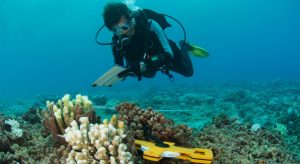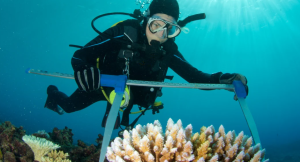Marine biology captivates people who want to explore the secrets of ocean life and contribute to the preservation of marine ecosystems. However, before embarking on this rewarding career, it’s essential to understand the financial aspects.
How much do salary for marine biologist earn in the UK, and what factors impact their earnings? In this article, we’ll explore the salaries of marine biologists, the highest-paying locations, career growth opportunities, and what makes this profession uniquely fulfilling.
What Does a Marine Biologist Do Day-to-Day?

Marine biologists engage in a range of responsibilities aimed at understanding, protecting, and managing marine life. Daily tasks may include field research, diving to observe marine habitats, collecting samples for analysis, and documenting findings that contribute to conservation efforts.
Other tasks often include laboratory analysis, data collection, and monitoring changes in marine environments to predict environmental impacts on various marine species.
The day-to-day role can vary significantly depending on the biologist’s specialization.
For instance:
- Marine ecologists may focus on ecosystem interactions.
- Fisheries biologists study fish populations and sustainable fishing practices.
- Marine microbiologists explore the microscopic organisms vital to marine ecosystems.
This combination of fieldwork and scientific analysis offers marine biologists both variety and a hands-on role in understanding and safeguarding marine life.
What Is the Average Salary for a Marine Biologist in the UK?
The salary for marine biologists in the UK varies widely based on experience, job level, and specialization.
Here’s a detailed breakdown:
| Experience Level | Average Salary | Description |
| Entry-Level | £20,000 – £25,000 | New graduates or those with up to 2 years of experience; typically engage in data collection and fieldwork. |
| Early-Career | £25,000 – £30,000 | Biologists with 2-5 years’ experience; may assist in research projects and have some specialized knowledge. |
| Mid-Career | £30,000 – £45,000 | Professionals with 5-10 years of experience; may lead small teams or projects within an organization. |
| Senior/Experienced | £45,000 – £50,000+ | Marine biologists with over 10 years of experience; often in leadership roles within research or academia. |
| Specialized/Leadership Roles | £60,000+ | Highly experienced professionals in research, academia, or consulting; may head projects or departments. |
At entry level, marine biologists often focus on gaining field experience and learning practical research skills. As they advance, they may move into project management or research leadership positions.
Those with specialized roles or leadership responsibilities can command higher salaries, especially if they possess advanced qualifications like a PhD.
What Are the Highest-Paying Cities for Marine Biologists in the UK?

Location plays a key role in salary variation, as certain regions in the UK have a higher demand for marine biology expertise and research facilities.
The table below lists cities where marine biologists tend to earn above-average salaries due to these factors:
| City | Average Salary | Description |
| Aberdeen | £46,043 | Home to research facilities and a strong oil and gas industry, Aberdeen requires marine expertise for environmental monitoring. |
| Plymouth | £37,983 | Known for the Plymouth Marine Laboratory, this city offers numerous research roles and a supportive scientific community. |
| Cambridge | £28,609 | A hub for scientific research, Cambridge offers opportunities despite its inland location, often in environmental consultancy. |
Aberdeen stands out as the top-paying city for marine biologists, benefiting from the region’s ties to the North Sea oil industry and marine research needs.
Plymouth, with its renowned Plymouth Marine Laboratory, is a significant center for marine science research, and the competitive salaries reflect the specialized work available.
Cambridge, while not coastal, hosts a wealth of research institutions where marine biology knowledge is in demand, especially in environmental consultancy and academia.
What Factors Influence a Marine Biologist’s Salary?
Several factors play a role in determining marine biologist salaries, including:
- Educational Background: Marine biologists with advanced degrees, such as a Master’s or PhD, are often eligible for higher-paying research or academic roles.
- Experience Level: Salaries increase with experience, and senior roles may include leadership responsibilities in project management or research teams.
- Employer Type: Government agencies, private research facilities, and environmental consulting firms often offer higher salaries than nonprofit organizations.
- Specializations: Areas like marine conservation, fisheries management, and marine technology development can impact salary, as some specializations are in higher demand.
Location, as noted earlier, also plays a significant role, with coastal research centres often offering higher salaries to align with local cost-of-living factors and high demand for marine expertise.
How Does a Marine Biologist’s Salary Compare with Related Careers in Marine Science?

Marine biology offers a competitive salary compared to other roles within marine science, although specific specializations or technical expertise can make a difference.
Here’s a detailed comparison:
| Job Role | Average Salary Range | Description |
| Marine Biologist | £20,000 – £50,000+ | Researches marine organisms and ecosystems; salaries vary based on experience and specialization within the field. |
| Oceanographer | £30,000 – £60,000 | Studies ocean currents, marine geophysics, and ecosystems; often requires advanced education and specialized skills. |
| Marine Ecologist | £25,000 – £45,000 | Focuses on ecosystem health and conservation efforts; salaries depend on demand for ecological expertise. |
| Fisheries Biologist | £22,000 – £40,000 | Monitors fish populations and sustainable practices; commonly employed by government agencies and conservation groups. |
Marine Biologist:
Earnings span a wide range, with entry-level roles generally lower and specialized research roles significantly higher. Marine biologists frequently work in research, conservation, and field-based roles requiring hands-on experience.
Oceanographer:
Often one of the higher-paid roles within marine science, oceanographers study physical and biological aspects of the ocean. Salaries reflect the advanced training and skills needed to analyze ocean currents, marine weather, and interactions with climate change.
Marine Ecologist:
These professionals focus on the interactions within marine ecosystems, often working in conservation or consulting roles to assess environmental impact and biodiversity. The role can sometimes offer less than general marine biology positions but remains competitive for those with a focus on ecosystem health.
Fisheries Biologist:
These scientists study fish populations and sustainable fishing methods, ensuring compliance with conservation standards. While the average salary is slightly lower than other marine science careers, fisheries biologists are essential to environmental regulatory bodies and can find work in both government and private sectors.
What Are the Opportunities for Career Growth in Marine Biology?
Marine biology provides multiple opportunities for career growth. Marine biologists can advance from entry-level field roles to senior research or management positions.
Many professionals also pursue additional certifications or graduate-level degrees to qualify for specialized roles within academia or private research organizations.
Some career advancement options include:
- Research Leadership: Senior marine biologists may lead research teams, mentor junior biologists, and contribute to published studies.
- Academic Roles: Those with advanced degrees can pursue careers in teaching and research at universities, with opportunities for continued fieldwork.
- Policy Advising and Consultancy: Marine biologists can work as environmental consultants, advising on conservation policies and working with government agencies or corporations on sustainable practices.
Are There Non-Monetary Benefits in a Marine Biology Career?

While salary is a primary consideration, many marine biologists value non-monetary rewards associated with their work.
These include:
- Fieldwork and Exploration: Marine biologists often travel to unique marine environments, from coral reefs to deep-sea ecosystems, engaging in fieldwork that few people experience.
- Contribution to Conservation Efforts: Many marine biologists play vital roles in conservation, helping to protect endangered species and restore fragile ecosystems.
- Collaborative Research: Working with scientists, environmentalists, and policymakers, marine biologists often find themselves in interdisciplinary teams that enrich their professional network and expertise.
For those with a passion for the environment, these benefits often hold as much appeal as the salary.
How Does Location Impact Marine Biologist Earnings in the UK?
Salary can be significantly influenced by location. Marine biologists in coastal cities, where marine research centres are based, often find higher-paying positions.
For example:
- Aberdeen: A prominent hub for marine and environmental research, especially in relation to North Sea ecosystems, Aberdeen offers marine biologists a competitive annual salary of £46,043.
- Plymouth: Known for the Plymouth Marine Laboratory and other research facilities, Plymouth provides an average annual salary of £37,983.
- Cambridge: This research-oriented city, although not coastal, offers opportunities in scientific research and marine studies, with average earnings around £28,609 per year.
Location-based pay differences reflect both demand and cost-of-living adjustments, especially in cities like Aberdeen and Plymouth, where the need for marine expertise is high.
What Skills Help Increase Earnings as a Marine Biologist?

Several skills can enhance a marine biologist’s earning potential:
- Advanced Data Analysis: Proficiency in data analysis software such as R and GIS is essential for interpreting complex environmental data and is highly valued in research and consultancy roles.
- SCUBA Diving Certification: Many marine biologists need to be certified divers, as field research often involves underwater observation. Advanced diving skills can open doors to specialized research positions.
- Technical Writing: Writing research papers, reports, and grant proposals is a critical part of a marine biologist’s job, especially for those aiming for academic or senior research positions.
These skills help marine biologists advance to more specialized, better-paying positions and improve their job prospects in competitive sectors.
What Are the Top Employers for Marine Biologists in the UK?
Marine biologists in the UK have opportunities to work with several leading organizations, including:
- Government Bodies: Agencies focused on environmental conservation and marine resources frequently employ marine biologists, offering stable positions with competitive salaries.
- Research Institutions: Organizations such as the National Oceanography Centre and British Antarctic Survey provide both research and practical experience, making them attractive employers for marine biologists.
- Private Sector: Environmental consulting firms and corporations involved in marine technology and sustainable practices often seek marine biology expertise, offering higher salaries to attract qualified professionals.
For those starting in the field, internships with these organizations can provide valuable experience and lead to long-term career growth opportunities.
Conclusion
Marine biology can be a rewarding career path, both financially and personally, for those passionate about marine conservation and ocean sciences.
With the potential to earn competitive salaries, particularly in high-paying cities like Aberdeen and Plymouth, marine biologists can build fulfilling careers that align with their interests.
By considering factors such as location, specialization, and skill development, aspiring marine biologists in the UK can look forward to a dynamic career that offers both financial stability and an opportunity to make a lasting environmental impact.
FAQs
How much does an entry-level marine biologist earn in the UK?
Entry-level marine biologists in the UK typically earn between £20,000 and £25,000 per year.
Is marine biology a high-paying career in the UK?
Marine biology offers competitive pay, particularly for experienced professionals in senior or specialized roles, although it may not be among the highest-paying scientific careers. However, the field offers numerous non-monetary rewards and opportunities for meaningful conservation work.
What qualifications do I need to increase my salary as a marine biologist?
To increase earning potential, marine biologists may pursue a Master’s degree or PhD, which can qualify them for higher-paying research or academic roles. Additional certifications, such as SCUBA or specialized data analysis skills, can also enhance job prospects.
Are there high-paying specializations within marine biology?
Yes, some specializations within marine biology offer higher salaries. Roles in oceanography, marine resource management, and environmental consultancy often provide increased earnings compared to general marine biology positions.
Does location affect a marine biologist’s salary in the UK?
Location has a significant impact on salary. Cities with established marine research centers or proximity to coastal ecosystems, such as Aberdeen, Plymouth, and Cambridge, generally offer higher salaries due to increased demand and regional funding.
What are the highest-paying sectors for marine biologists?
Government and private sector roles, particularly within environmental consulting firms and marine research institutions, tend to offer the most competitive salaries for marine biologists in the UK.
Can marine biologists work internationally, and how does that affect salary?
Yes, marine biologists can find opportunities internationally, with competitive salaries often available in countries with robust marine research industries, such as the United States, Australia, and Canada. International roles may also offer unique fieldwork experiences and increased pay depending on the region.




